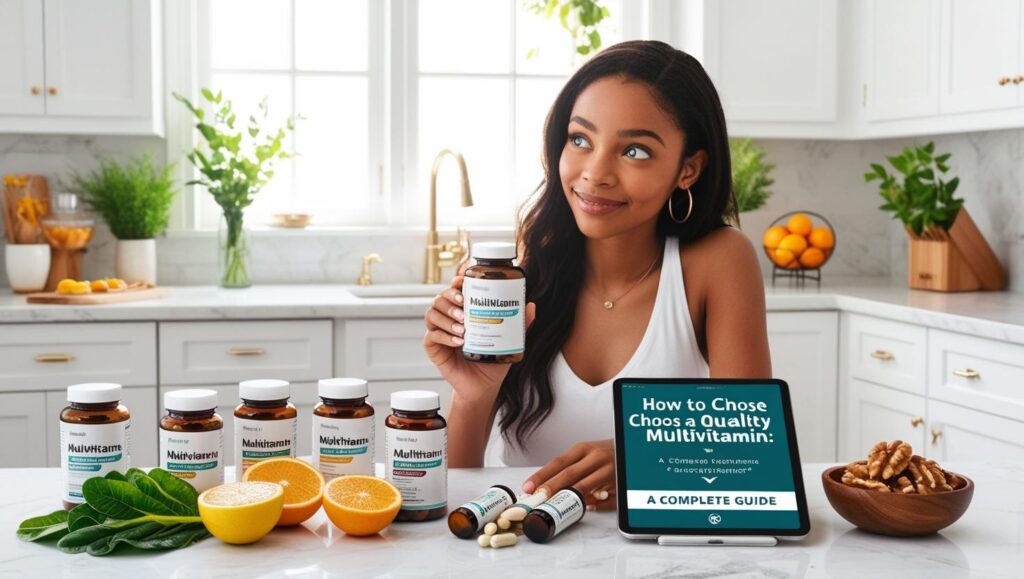With today’s busy lifestyles, it isn’t surprising that multivitamins have become an increasingly common solution for filling in nutritional shortfalls and boosting overall health.
A good diet is always top of mind first, of course, but an excellent multivitamin can do some wonderful things if taken in moderation. But not all multivitamins are equal in quality—some are packed with fillers, some lack bioavailable nutrients, and some are even incomplete. So how do you know which one is best?
Here, we’re going to detail what it takes for you to confidently pick a top-quality multivitamin that suits your individual needs.
Why Take a Multivitamin?

Before we discuss how to pick one, it is necessary to know why you may even need a multivitamin in the first place.
- Nutrient shortfalls: Even in healthy diets, certain key vitamins and minerals are lacking, e.g., vitamin D, magnesium, and iron.
- Lifestyle factors including stress, poor sleeping habits, uneven meals, or certain diet (such as veganism or keto) can impact nutrient consumption.
- Age-specific requirements: The elderly might have higher requirements for calcium, vitamin B12, or vitamin D.
- Health conditions: Individuals who have digestive disorders, long-standing illnesses, or particular drug regimens can be helped through supplementation.
A multivitamin can help ensure that you’re not falling short on nutrients that are necessary for optimal body function.
1. Understand Your Nutritional Requirements
Step one in selecting an appropriate multivitamin is knowing what your individual needs are. No single formula works for everyone.
- Men versus women: Women might require more iron and folic acid, particularly in child-bearing age, while men tend to need less iron.
- Age-specific: Seniors can need increased levels of B12, D3, and calcium.
- Lifestyle: Highly active people or athletes can use more magnesium, B-complex, and antioxidants.
- Diet type: Vegetarians or vegans may require additional B12, iron, iodine, and zinc.
Tip:
Get a blood test or consult a healthcare provider in order to determine if any deficiencies need correcting before supplementing blindly.
2. Check for Third-Party Testing and Certifications
A good multivitamin needs to be third-party tested for purity and potency. The supplement market is not regulated as strictly as pharmaceuticals are, so third-party testing guarantees you get what the product says on the package—without heavy metal contaminants or toxic additives.
Trusted Certifications To Look Out For
- USP Verified (U.S. Pharmacopeia)
- NSF Certified
- ConsumerLab Approval
- Non-GMO Project Verified
- Certified Organic
Such labeling ensures that the product has ingredients and processing methods that are of high quality.
3. Prioritize Bioavailability
One of the most underappreciated factors in selecting a multivitamin is bioavailability—the extent to which your body can absorb and utilize the nutrients. More affordable vitamins employ forms of nutrients that are challenging for your body to metabolize.
Select These Bioavailable Forms
| Nutrient | Recommended Form |
|---|---|
| Vitamin B12 | Methylcobalamin (not cyanocobalamin) |
| Folate | Methylfolate (not folic acid) |
| Magnesium | Magnesium citrate or glycinate (not magnesium oxide) |
| Zinc | Zinc picolinate or citrate |
| Iron | Iron bisglycinate (less irritating to the gut) |
Export to Sheets
Shun those products that employ generic or synthetic forms in place of a compound name.
4. Verify Dosages and Prevent Megadoses

More is not necessarily better. Whereas some vitamins are water-soluble and are simply processed and eliminated in excess amounts, fat-soluble vitamins (A, D, E, and K) can build up and become toxic if one consumes large amounts regularly.
What to Watch For:
- Take 100% of the Recommended Daily Allowance (RDA) for all vitamins and minerals except when otherwise directed by a physician.
- Shun multivitamins with really high concentrations of single nutrients except where clinically warranted.
- Certain items promote megadoses as an advantage, but it can cause more harm than benefit.
5. Refrain from Harmful Fillers and Additives
Most low-quality supplements are packed with unnecessary fillers, artificial colorings, preservatives, and sweeteners that deliver no health benefit—and can even have negative long-term implications.
Ingredients to Avoid:
- Titanium dioxide
- Food colorings (such as FD&C Red #40)
- Magnesium stearate (controversial in large doses)
- Hydrogenated oils
- Talc or silica
A cleaner list of ingredients tends to suggest superior product integrity.
6. Select the Best Format for You
Multivitamins are available in several different forms including tablets, capsules, softgels, powders, and even gummies.
Benefits and Disadvantages
| Format | Benefits | Disadvantages |
|---|---|---|
| Capsules | Simple to take, tend to have fewer additives. | |
| Tablets | Carry more ingredients but are more difficult to digest. | More difficult to digest |
| Softgels | Ideal for fat-soluble nutrients but can include gelatine (non-vegan). | Can include gelatine (non-vegan) |
| Powders | Ideal for custom blends or high-dose recipes. | |
| Gummies | Delicious but tend to have fewer nutrients and are high in sugar. | Fewer nutrients, high in sugar |
Export to Sheets
Opt for a form you are most likely to use repeatedly, without reducing quality.
7. Brand Reputation Matters
Stick to those companies which have a record of openness, scientifically proven ingredients, and good reviews.
Questions to Ask
- Does the brand disclose its manufacturing and sourcing processes?
- All three methods are based on scientific studies.
- Easy access to Certificates of Analysis (COA) exists.
- Are ingredients clearly labeled?
Some of these highly regarded supplement brands are Thorne, Pure Encapsulations, Garden of Life, Ritual, and Nature Made (USP verified).
8. Consider special formular
Numerous high-grade companies sell specialized multivitamins that address individual needs.
- Prenatal vitamins: Increased in folate, iron, and DHA.
- Men’s health may include lycopene and saw palmetto.
- Bone health: Increased calcium, magnesium, vitamin D and K2.
- Immune system support: Increased doses of C, D3, and zinc.
Instead of a single formula for all, pick one which is formulated for your needs right now.
9. Read Label Very Closely

This may seem self-evident, but lots of people bypass reading the entire label. Spend a few minutes and:
- Check serving size (2–4 pills are required daily for complete dosage).
- Examine the entire list of active and inactive ingredients.
- Shunned proprietary blends lacking quantitative disclosure.
- Expiration date and storage instructions (especially for probiotics or fish oil blends).
10. Talk to a Professional
Although most people self-select multivitamins, it is always best to check in with a registered dietitian, nutritionist, or physician if you:
- Have a longstanding health issue
- Are on any medications that may interact with supplements
- Are pregnant, nursing, or are planning pregnancy
- Considering high-dose or specialized supplementation
Final Thoughts
Selecting a good multivitamin is not about grabbing the most expensive bottle on the shelf—but about making an educated choice based on your individual health needs, ingredients quality, and company integrity. By bypassing flashy packaging and getting into what truly counts—bioavailability, third-party testing, and pure ingredients—you can make a choice that really works for your health. Keep in mind that supplements are just supplemental. A diet of whole foods should always remain the cornerstone of your health plan. That being said, a good multivitamin can make you feel great if used properly and can help bridge nutritional gaps and aid in your long-term health objectives.
Related Posts
- Top 10 Signs You’re Deficient in Key Nutrients
- Should You Take Vitamins Every Day? Pros and Cons
- Best Natural Supplements for Energy Boost
![]()






